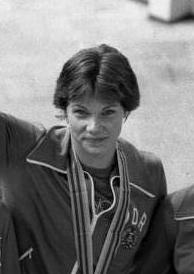Career
Reinisch was born in Seifhennersdorf, Bezirk Dresden (now Saxony), and first competed at the age of eight. Her swimming abilities earned her a place in the Dresden Sports School. At 12 years old, she had already swum the 100 m backstroke in 1:14.3. Two years later, at 14, she was ranked as the twentieth female swimmer in the world in the 100 m backstroke with 1:04.84.
In January 1980, she realized that she had the potential to become an Olympic champion. In the swimming invitational in Austin (Texas), a kind of "world female championship", she was barely beaten by the American world champion Linda Jezek (1:03.74 to 1:03.15). One month later she recorded a time of 1:02.46, better than every active swimmer, less than one second away from the world record held by her countrywoman Ulrike Richter. In the 200 m backstroke she went under 2:20 at 2:15.59. The "records route" was opened for Reinisch. The hardest was, maybe, winning the national championships where she suffered one defeat by Petra Riedel. But she improved in time for the Olympic Games. Shortly before she had swum the 100 m backstroke in 1:01.77.
East German Doping
Reinisch, like many of the East German athletes of the time, was doped by her coaches under instruction from the Stasi. Swimmers were doped with oral-Turinabol, an anabolic steroid derived from testosterone. [1] After suffering severe period pain and enlarged ovaries, her mother forced her to retire at the age of sixteen, just after the Moscow Olympics.
After the fall of the Berlin Wall and the reintegration of East Germany, records confirmed the doping scandal. By this time, Reinisch had married and had already suffered two miscarriages. [2] Like most of the East German athletes, Reinisch was compensated in an ensuing court case on the matter. Reinisch now has two children, and was later quoted as saying: "The worst thing is they took away from me the opportunity to ever know if I could have won the gold medals without the steroids. That's the greatest betrayal of all." [3]
This page is based on this
Wikipedia article Text is available under the
CC BY-SA 4.0 license; additional terms may apply.
Images, videos and audio are available under their respective licenses.
